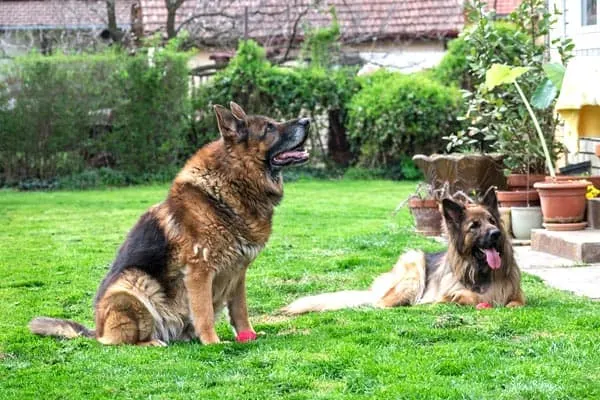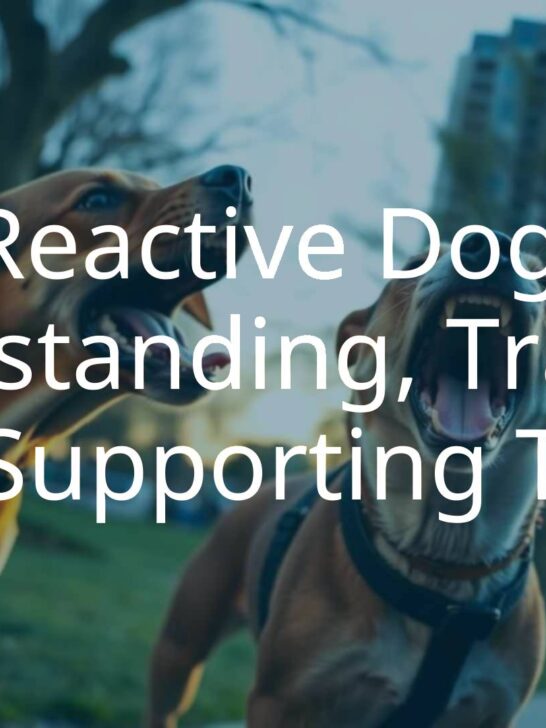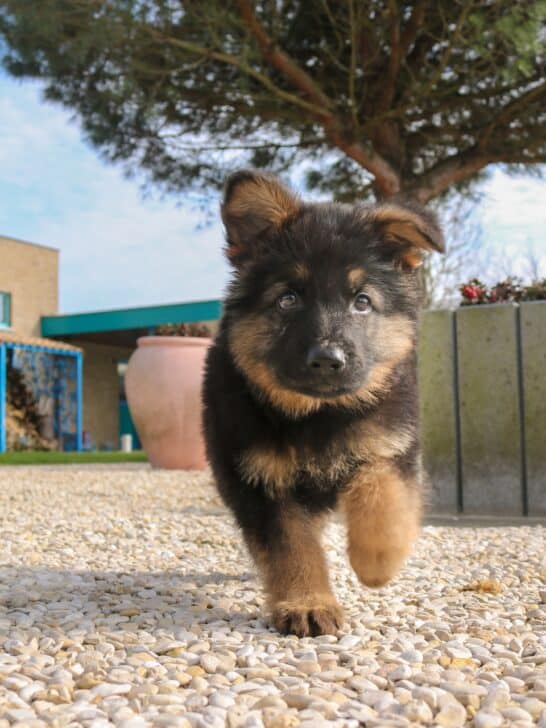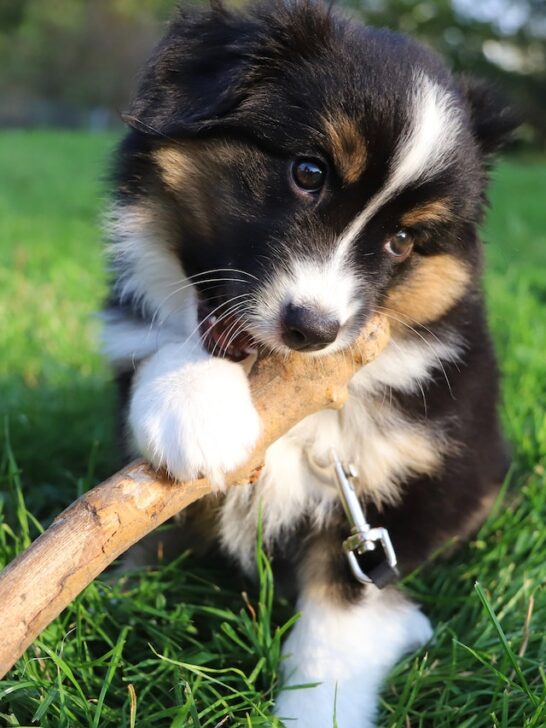Is It Good to Have Two German Shepherds: Here’s What You Need to Know
Is It Good to Have Two German Shepherds?
This question is a very valid one to ask. The short answer is yes, but from getting two German Shepherd puppies at the same time to acquiring a second adult dog, there are pros and cons to both approaches that you will benefit from reading more about.
Why Getting Two German Shepherd Puppies Can Be a Good Idea
Raising two Shepherd puppies at once can be quite a worthwhile experience, but requires the right type of person.
Like any other dog, German Shepherds can cause their fair share of trouble as puppies. They chew a lot, and it might seem like owners spend a lot of their time correcting the puppies over their habits.

However, one advantage this breed offers is how eager even puppies are to learn. When you start training early and are consistent, your puppies will understand what they are supposed to do very easily. Puppies raised together are likely to bond quickly.
As puppies that show the promise of becoming large dogs very quickly, getting both puppies used to going on walks or other activities is essential for them to get used to interacting with new people. Better socialization makes all the difference.
If you live in a setting where your puppies will have easy access to the outdoors, it will be that much easier to help them meet their exercise needs. Because young GSDs are high-energy, exercise always helps keep them calm and focused.
Having two puppies who grow up together will help them get along better. Many of the conflicts that might otherwise arise between dogs are less of a problem with two German Shepherd puppies who have grown up together.
Another advantage of having two dogs together from puppyhood is that they will learn to share resources, including toys, food, sleeping space, and the owner’s attention more easily. Dogs that learn to share resources easily will be less possessive.
Being able to train both dogs at the same time, as is often the case with puppies, is another significant advantage. Being able to teach both dogs at once makes it easier to train them in less time. The sooner your puppies are trained, the better for them.
Shepherds raised in the same household from an early age could have fewer problems than you would find from adding another dog later. After all, an adult dog introduced into a home could have acquired bothersome behavior that is hard to cope with.
However, buying or adopting two puppies may not be the best solution for every household. There are advantages to adding an adult dog as well. Owners will do well to consider the advantages or disadvantages of both situations.
Does Getting Another German Shepherd Stop Dog Aggression?
One common concern that German Shepherd owners have is whether a second dog might eliminate dog aggression issues. The logic is that a dog who tries to dominate other peoples’ dogs might calm down with another dog to balance things.
A second GSD should seldom become a problem. Your main concerns should involve the feasibility of an additional pet in general.
As when you add any other pet to your household, some of the essential considerations you’ll have to think of include providing sufficient attention, food, exercise, and veterinary care. All of these are vital factors in any new dog.
One of the most severe mistakes for anyone who gets a new dog to make is giving the new dog a lot of attention while spending less attention on the first dog. It will be very important to find a healthy balance in how you provide attention to your dogs.
Each dog will require individual attention to make sure they receive the right amount of interaction. However, one dog should not receive a large amount of attention in front of the other. Doing so will probably encourage a rivalry between the two.
Another consideration besides time and attention that you will need to keep in mind if acquiring a second dog is what resources you have for additional food, exercise, and veterinary care. The decision to take a second German Shepherd is important.
German Shepherd Dogs can have special feeding needs, including eating foods that protect joint health. Food sensitivities and allergies may require one dog to have special food. Merely buying a bigger bag of food might not fit the dogs’ needs.
You’ll need to think about how easy it will be to make sure both dogs get sufficient exercise. Daily walks can be helpful but are better if someone else in your household can assist. Supervised play in a fenced-in yard might be the best option.
The higher veterinary costs are also an important consideration. German Shepherds are susceptible to health issues that range from bone and joint problems to gastric torsion. When you have two of these dogs, being able to afford care is vital.
Adding a second Shepherd to your home when you already have one can be a good choice. In most cases, the dogs should get along well, with minimal fuss, as long as you supervise both of them. However, making sure that you are in a position to handle both dogs is ideal.
After all, circumstances can arise, from special dietary needs due to an unforeseen medical condition to a job schedule change that leaves you with less time for outdoor play to an unexpected health condition on one of your dogs’ parts.
If you have plans to deal with any of these circumstances, adding another German Shepherd might be a good choice for you. Your current dog will probably adjust well to the second dog, with a similar size, temperament, and activity level.
Do German Shepherds Have a Lot of Same-Gender Aggression?
One of the things you might need to think about if you decide to have two German Shepherds is whether you want to have two dogs of the same or opposite gender. There are advantages and disadvantages that are important for GSD owners to consider.
According to Austerlitz German Shepherds, the dog’s environment makes the most significant difference in how the dogs will adjust, even though gender will, of course, play a role.
Genetics also plays a role in a dog’s temperament, which is something that a dog’s owners have less control over. In the case of owners who acquire a second dog through a breeder, being able to observe the parents’ behavior is crucial in choosing.
Contrary to popular belief, neither gender is more or less likely to have aggression issues. Some dogs of the same gender get along perfectly well, while others do better with another dog of the opposite sex.
If you want to get a second GSD, consider how your dog behaves around other dogs you encounter, such as neighbors’ or friends’ dogs. A dog that is reactive toward dogs of the same sex would probably do better with a dog of the opposite sex.
The good thing is that taking steps like having both dogs altered when possible and practical, as well as making sure the introductions are done correctly, will help ensure that both dogs get along as well as possible.
How Do You Properly Introduce Two German Shepherds?
Although introducing your German Shepherd to another dog can be stressful, the good news is that this doesn’t need to be a cause for stress. Taking some steps to ensure that the introduction goes as smoothly as possible is a good idea.
This video demonstrates how smoothly an introduction can go when done properly. Allowing the dogs to represent each others’ space is a vital part of making sure things go well.
Meeting in a neutral setting works best for these dogs. Examples include dog parks or someone else’s yard.
Both dogs should be leashed for the best results. In fact, taking a walk together is one of the best ways to start the introduction. The dogs should be kept at a healthy distance from each other during their walk to avoid any possible problems.
After the dogs have had a chance to rest for a moment after the walk. The dogs should be allowed to smell each other for a couple of minutes. After they do this, it should be safe to allow them to interact with the leashes still attached.
Watch the behavior of the German Shepherd Dogs very carefully. If you see behavior that indicates a willingness to play, like bowing or tail-wagging, encourage the dogs to play together gently to help them get better acquainted.
When both dogs are going to be in the house together, it is an excellent idea to let the new dog in first. Let your first dog in next. Make sure you keep an eye on the dogs so you can separate them if there are signs of aggression or tension that could escalate.
If the dogs show any signs of hostility, separate them, and only allow them to interact again after they have calmed down. For at least the first few days, you should make sure the German Shepherds are not left alone unattended.
Making sure each dog has a training crate or other dedicated area to sleep will help the dogs maintain proper space. When a dog has a crate where they sleep or spend time when you’re away from home, that is a dedicated space that provides security.
When dogs have “den” or sleeping space, they are less likely to become territorial about the other areas of your home. However, you need to make sure the dogs respect each others’ space. Never encourage the dogs to enter each others’ crates.
Dogs who have had proper introductions are not usually as likely to fight. Ensuring the dogs have separate areas to rest and sleep helps to make a difference. Even though these methods are not entirely fool-proof, they are helpful.
Is Aggression Between German Shepherds Easy to Overcome?
In some cases, aggression has its roots in two intact dogs of the same gender having problems. These types of disputes have their origins in sexual frustration. However, there is a remedy in the form of having one or both dogs spayed or neutered.
Neutering can help eliminate aggression, especially in the case of two males.
Aggression between two German Shepherds can be terrifying, considering the size that most of these dogs reach. Even though steps like trying and having the dogs altered can make a difference, aggression between the two could occur at some point.
Dogs this size who start fighting can inflict injury on each other or anyone who tries to stop the fight. Knowing how to stop a row in a way that reduces the threat of harm is essential.
When your dogs have difficulty getting along, it is vital that you know how to deal with the situation. Any number of circumstances can lead to dogs fighting, from quarrels over food to fights over toys.
If your dogs have a disagreement, you need to know how to eliminate the problem in a positive way that reduces the possibility of injury. Having taken steps to introduce your dogs properly will reduce the likelihood of the fight being drawn-out.
Use one of your diversionary techniques to get both dogs’ attention, taking their attention away from each other. Remove whatever is triggering their hostility, such as food or a toy. Separate the two dogs to give them time to calm down.
Once the dogs have had a chance to settle down, allow them back into the same area, with proper supervision. Reward both dogs with praise and treats or pats for behaving themselves. Rewards for good behavior will accomplish more than negativity.
Two German Shepherds can be a perfect addition to any household, regardless of whether they have been raised together or if one of the dogs is a later addition. Being adequately prepared and making proper introductions makes a world of difference.



















